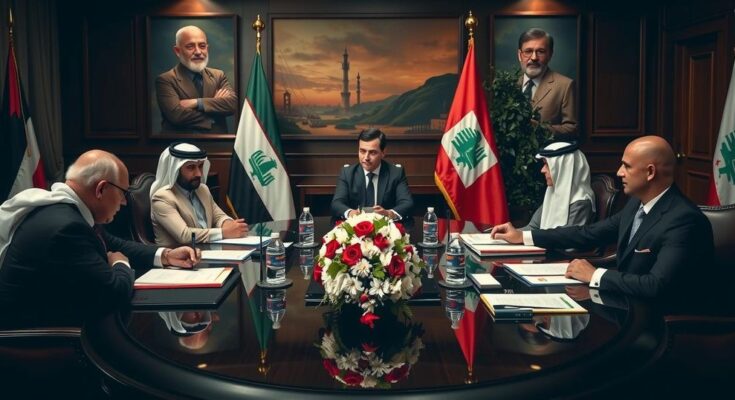Secretary of State Antony Blinken concluded a week of high-level diplomatic meetings addressing the urgent conflicts in Gaza and Lebanon. Essential discussions with leaders from the UAE, Lebanon, and Jordan underscored the need for a diplomatic resolution to end hostilities, ensure humanitarian aid, and bolster regional stability while upholding United Nations resolutions. Both Blinken and regional leaders emphasized the criticality of collaboration and dialogue in achieving lasting peace and security.
Secretary of State Antony Blinken concluded a week of intensive diplomatic efforts in the Middle East with key meetings in London. On Friday, he met with prominent officials including United Arab Emirates Foreign Minister Sheikh Abdullah bin Zayed Al Nahyan, Lebanese Caretaker Prime Minister Najib Mikati, and Jordanian Deputy Prime Minister Ayman Safadi. During these discussions, Blinken emphasized the necessity of ending the ongoing war in Gaza and securing the release of hostages while also contemplating the post-conflict future. In his discussions with Sheikh Al Nahyan, Blinken highlighted the importance of a diplomatic resolution to the situation in Lebanon, aligning his perspective with United Nations Security Council Resolution 1701—a resolution aimed at addressing tensions in the region. He expressed gratitude for the UAE’s humanitarian aid contributions to Lebanon and Gaza. When speaking with Prime Minister Mikati, Blinken confirmed the United States’ dedication to a diplomatic resolution in Lebanon, reiterating that such efforts should uphold UN Security Council mandates and facilitate the return of displaced persons across the Blue Line. He also stressed the United States’ ongoing support for Lebanon’s institutions, including its armed forces, and expressed concern for civilian casualties and humanitarian crises affecting vulnerable populations, reinforcing the U.S. commitment to assistance. Blinken’s engagement with Safadi was part of a broader dialogue about regional stability, in which he recognized Jordan’s pivotal role in supporting Palestinians and providing assistance in Gaza. He remarked on the importance of Jordan as a key ally, particularly during a time of great urgency related to the violence in Gaza and the need for a coherent path forward. Notably, both Safadi and Blinken articulated the necessity for immediate cessation of hostilities in the region, with Safadi pointing out the precarious situation that could escalate into a larger conflict if unilateral actions by Israel were not halted, calling for effective measures to ensure lasting peace. In his statements, Blinken reinforced the importance of diplomatic resolutions to preserve life and ensure safety along the Israel-Lebanon border while advocating for the well-being of civilians caught in conflict. He reiterated the urgent need for dialogue to prevent further escalations and to support a resolution that emphasizes human rights and security for all involved. Moreover, bilateral discussions aim at addressing the refugee crisis in Lebanon, with Safadi underscoring Lebanon’s readiness to implement Resolution 1701 to safeguard lives and manage the humanitarian situation worsening in the region.
This article discusses the diplomatic initiatives undertaken by United States Secretary of State Antony Blinken throughout the Middle East, focusing on his meetings with key leaders from the United Arab Emirates, Lebanon, and Jordan. The ongoing Gaza conflict and the humanitarian crises in the region are significant points of concern during these discussions. The article highlights Blinken’s commitment to diplomatic resolutions, respect for international law, and the importance of collaborative efforts among regional partners to stabilize Lebanon and address the overarching conflict between Israel and its neighboring countries.
In conclusion, Secretary Blinken’s diplomatic engagements throughout the week underscore a concerted effort by the United States to address the ongoing crises in Gaza and Lebanon. The meetings reflected an urgent call for collaborative diplomacy among regional partners, emphasizing the need for immediate cessation of hostilities, humanitarian assistance, and support for international resolutions. The discussions also highlighted the critical role of countries like the United Arab Emirates and Jordan in fostering stability in a region fraught with tensions and potential conflicts. Ultimately, Blinken’s remarks and the responses from regional leaders serve to reinforce the essential nature of unity and dialogue in seeking a secure, peaceful future.
Original Source: www.jpost.com




